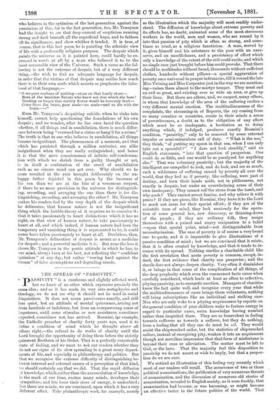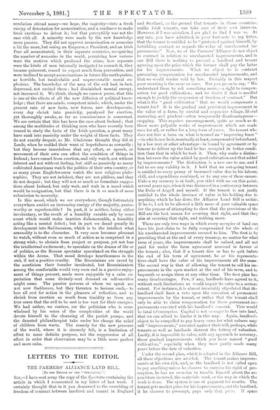THE SPREAD OF "PASSIVITY."
" pASSIVITY " is a cumbrous and slightly affected word, but we know of no other which expresses precisely the same idea ; and as it has made its way into metaphysics and theology, we do not see why it should not be used in social disquisition. It does not mean passiveness exactly, and still less quiet, but an attitude of mental quiescence, arising not from lassitude or indolence, but from an overpowering sense of impotence, until some stimulus or new assistance, sometimes expected, sometimes not, has arrived. Rosmini, for example,_ the Catholic preacher of charity forty years ago, used it to define a condition of mind which he thought above all others right,—the refusal to do works of charity until the Lord brought the opportunity of doing them before the strictly quiescent Brethren of his Order. That is a perfectly conceivable state of feeling, and we want to ask our readers whether they do not see signs of its slow spreading in a great many depart- ments of life, and especially in philanthropy and politics. But that we recognise the extreme difficulty of distinguishing be- tween internal and external causes of a perception of that kind, we should certainly say that we did. That the rapid diffusion of knowledge, which, rather than the accumulation of knowledge, is the mark of our time, excites many minds, developes their sympathies, and lets loose their store of energy, is undoubted ; but there are minds, we are convinced, upon which it has a very different effect. Take philanthropic work, for example, merely as the illustration which the majority will most readily under- stand. The diffusion of knowledge about extreme poverty and its effects has, no doubt, animated some of the most strenuous workers in the world, men and women, who are roused by it into that passion of pity which is often as strong, and some- times as cruel, as a religions fanaticism. A man, moved by it, gives himself and his substance to the poor with an unre- serve, and an unselfishness, and a persistency of effort which only a knowledge of the extent of the evil could excite, and which no single case just brought before him could provoke. That there should be multitudes without bread, thousands without sufficient clothes, hundreds without pillows—a special aggravation of poverty once universal in pauper infirmaries, till it roused the late Miss Twining and Miss Carpenter just in the way we are mention- ing—raises them almost to the martyr temper. They must end an evil so great, and existing over so wide an area, or give up their lives. But there are others,-and, we suspect, many others, in whom that knowledge of the area of the suffering excites a very different mental emotion. The multitudinousness of the complaints, the streaming-in of Reports, the cry coming from so many counties or countries, create in their minds a sense of powerlessness, a doubt as to the obligation of any effort which must be so inadequate, a hesitation as to doing anything which, if indulged, produces exactly Rosmiui's condition, "passivity," only to be removed by some external impulse or semi-miraculous call of duty. "What is the use," they think, "of putting my spoon in that sea, when I can only take out a spoonful ?" "I dare not look steadily," said an English statesman, "into that question of pauperism. One could do so little, and one would be so paralysed for anything else." That was voluntary passivity ; but the majority of the intelligent are compelled to look, and do look, and see so much, such a wilderness of suffering caused by poverty all over the world, that they feel as if poverty, like suffering, were part of destiny, and turn their heads aside, not in pitilessness, not exactly in despair, but under an overwhelming sense of their own inadequacy. They cannot roll the stone from the tomb, and why push P They cannot arrest famine, and why relieve it with pence ? If they are pious, like Rosmini, they leave it to the Lord to mark out cases for their special effort ; if they are of the scientific turn of mind, they look anxiously for the opera- tion of some general law, new discovery, or thinning-down of the people ; if they are ordinary folk, they resign themselves with a pained and angry resignation to a belief —upon that special point, mind—not distinguishable from necessitarianism. The case of poverty is of course a very broad one to quote, and it is impossible to give illustrations of a passive condition of mind ; but we are convinced that it exists, that it is often created by knowledge, and that it tends to in- crease with its spread. Nothing startles a charitable child like the first revelation that acute poverty is common, except, in- deed, the first evidence that charity can pauperise ; and the startle does not always deepen charity.. Very often it diminishes it, or brings in that sense of the complication of all things, of the deep perplexity which even the commonest facts cause when carefully considered, which leads at least as often to reflective, pitying passivity, as to energetic exertion. Managers of charities know the fact quite well, and recognise every year that while the multitudinousness of cases brings them volunteers, nothing will bring subscriptions like an individual and striking case. Men who are only woke to a pitying acquiescence by reports on the general condition of poor children wake to furious energy in regard to particular cases, extra knowledge having numbed rather than inspirited them. They are as benevolent in feeling towards sufferers as towards a sufferer, but they do nothing, from a feeling that all they can do must be nil. They would assist the shipwrecked sailor, but the statistics of shipwrecked sailors, instead of energising pity, weaken it into an acquiescent though not merciless impression that that form of misfortune is beyond their cure or alleviation. The matter mast be left to God, or the laws. That the majority feel this disposition to passivity we do not assert or wish to imply, but that a propor- tion do we are sure.
We noticed an illustration of this feeling very recently which most of our readers will recall. The occurrence of two or three political assassinations, the publication of very numerous threats of assassination, and the discussion of numerous old stories of assassination, revealed to English society, as it were freshly, that assassination had become, or was becoming, or might become an effective factor in the future politics of the world. That
revelation stirred many—we hope, the majority—into a fresh energy of detestation for assassination, and a readiness to make fresh exertions to defeat it; but that perceptibly was not the case with all. A minority were made by the new knowledge more passive. They did not approve assassination or assassins a bit the more, but seeing an Emperor, a President, and an Irish Peer all assassinated, in their separate countries, recognising the number of assassins in the world, perceiving how various were the motives which produced the crime, how separate were the kinds of men internally instigated to commit it, they became quiescent, ceased to expect much from prevention, and were inclined to accept assassinations in future like earthquakes, as horrible, but incalculable and unpreventa.ble moral ex- plosions. The knowledge of the area of the evil had, in fact, depressed, not excited them ; had diminished mental energy, not increased it. We think, though we cannot prove, that this is one of the effects of all the new diffusion of political know- ledge; that there are minds, competent minds, which, under the present rain of new facts, new forces, new developments, every day shrink into passivity, paralysed for exertion, yet thoroughly awake, as far as consciousness is concerned. We are certain that this has been the case about Ireland ; that among the multitudes of thinking men who have recently been roused to study the facts of the Irish question, a great many have stink into passivity under the weight of those facts. They do not exactly despair, as Mr. Gladstone thought they did at Leeds, when he scolded their want of hopefulness as cowardly ; but they become incredulous that any effort, or speech, or movement of their own can affect the condition of things in Ireland; have ceased from exertion, and only watch, not without interest and not without feeling, but still as passively as many cultivated Americans watch the politics of their own country, or as many pious Englishwomen watch the new religious philo- sophies. They are not indolent, they are not pitiless, and they do not despair; but they will not so much as formulate sugges- tions about Ireland, but only wait, and wait in a mood which would be resignation, but that there is in it so much of mere submission to necessity.
Is this mood, which we see everywhere, though fortunately everywhere amidst an increasing energy of the majority, praise- worthy or reprehensible ? In part, it is neither, being either involuntary, or the result of a humility curable only by some event which would make inaction dishonourable, a humility acting like a mental defect ; but in part we dread: greatly its development into Sadduceeism, which is to the intellect what sensuality is to the character. It very soon becomes pleasant to watch, without even so much of action as is comprised in a strong wish ; to abstain from project or purpose, yet not lose the intellectual excitement ; to speculate on the drama of life or of politics, as the Roman spectator speculated on the struggle within the Arena. That mood develops heartlessness in the end, if not a positive cruelty. The Rosminians are saved by the asceticism their founder inculcated, but Rosminianism among the comfortable would very soon end in a passive enjoy- ment of things present, made more enjoyable by a calm ex- pectation that some divinely-sent demand on self-sacrifice might come. The passive persons of whom we speak are not now Sadducees, but they threaten to become such,-- to lose all zest for action in the pleasure of reflection, and to shrink from exertion as much from timidity as from any true sense that the evil to be met is too vast for their energies. We had rather, we confess, see the politician who is over- whelmed by his sense of the complexities of the world devote himself to the cleansing of the parish pumps, and the daunted philanthropist take under his charge the relief of children from warts. The remedy for the new pressure of the world, where it is sincerely felt, is a limitation of effort to some definite purpose, not the suppression of all effort in order that observation may be a little more perfect and more calm.



































 Previous page
Previous page